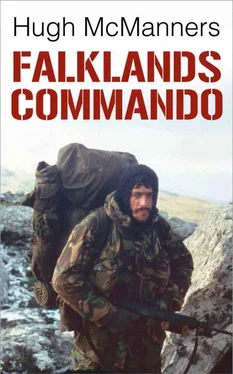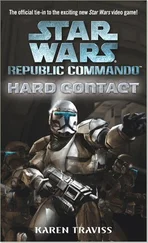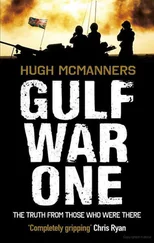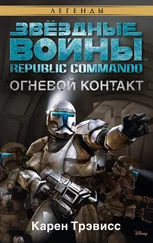Hugh McManners - Falklands Commando
Здесь есть возможность читать онлайн «Hugh McManners - Falklands Commando» весь текст электронной книги совершенно бесплатно (целиком полную версию без сокращений). В некоторых случаях можно слушать аудио, скачать через торрент в формате fb2 и присутствует краткое содержание. Город: London, Год выпуска: 2014, ISBN: 2014, Издательство: Nightstrike Publishing, Жанр: nonf_military, Биографии и Мемуары, на английском языке. Описание произведения, (предисловие) а так же отзывы посетителей доступны на портале библиотеки ЛибКат.
- Название:Falklands Commando
- Автор:
- Издательство:Nightstrike Publishing
- Жанр:
- Год:2014
- Город:London
- ISBN:978-0-992-81540-0
- Рейтинг книги:4 / 5. Голосов: 1
-
Избранное:Добавить в избранное
- Отзывы:
-
Ваша оценка:
- 80
- 1
- 2
- 3
- 4
- 5
Falklands Commando: краткое содержание, описание и аннотация
Предлагаем к чтению аннотацию, описание, краткое содержание или предисловие (зависит от того, что написал сам автор книги «Falklands Commando»). Если вы не нашли необходимую информацию о книге — напишите в комментариях, мы постараемся отыскать её.
Falklands Commando — читать онлайн бесплатно полную книгу (весь текст) целиком
Ниже представлен текст книги, разбитый по страницам. Система сохранения места последней прочитанной страницы, позволяет с удобством читать онлайн бесплатно книгу «Falklands Commando», без необходимости каждый раз заново искать на чём Вы остановились. Поставьте закладку, и сможете в любой момент перейти на страницу, на которой закончили чтение.
Интервал:
Закладка:
Meanwhile in the outside world, the public continue to soak up much-hyped books by ‘SAS authors’. At best the public are reading books ghosted by professional thriller writers who know how to spin out a good yarn. At worst they are reading some very tall tales indeed, by people who were never badged members of the Special Forces, or indeed in the case of at least one particular best-selling author, had invented both their SAS credentials and the extraordinarily damaging events they said they had been involved with.
Falklands Commando escaped the nightmare of civil service interference and military censure solely because of the support of the then Director of Army Public Relations, now recently retired Inspector of Her Majesties Prisons, Baron the Lord David Ramsbotham.
During the actual fighting of the Falklands war, the MoD’s desire to control the public’s understanding of events was far more intense. Their media campaign was flawed, many mistakes were made, and David Ramsbotham had struggled with senior Civil Servants to establish a sensible system by which journalists could be handled fairly. But even though some lessons were learned, which helped in the Gulf War nine years later, relationships between the media and the MoD (and the over-arching government media handling machine) have remained fraught with suspicion, dishonesty and anger. This is a serious, unnecessary and unworthy problem, which will seriously affect future military operations.
Even now, in 2002, twenty years and several large-scale operations further on, the MoD’s media handling department remains antagonistic to the media upon which it depends. In 1982, many UK journalists were strong supporters of the military, and we still had proper defence correspondents on our national newspapers, who’d taken years learning about the armed forces in order to report military matters accurately for a readership that was interested. (Today, only Michael Evans and Sean Rayment could be described as professional, long-term defence correspondents, and they are endangered species.)
But rather than help potentially co-operative journalists to acquire and file helpful stories, MoD civil servants tried to control the media, a fruitless effort during the Falklands War, fronted by the robotic-sounding Ian MacDonald – an unhelpful, deliberately pedantic spokesman. It was as though the MoD saw itself fighting two wars: one on the other side of the world against the Argentine forces, and the other closer to home. The MoD was just not understanding the reality of media life, that regardless of any other consideration, the pages and television time had to be filled. One of the colonels I worked with in the MoD on my return from the war (who is now a general), described Falklands War press conferences as if they were football riots: “The press came swarming in here every day demanding to know what was going on – like vermin .” I know now, having degenerated into journalism myself for a time, that many of the British ‘vermin’ were well aware of the need for security, and would have written stories that were less damaging than many of the ones that were printed – or even just photographs, had the MoD been less autocratic, and worked to establish some good working relationships with particular people.
But the MoD’s media department had already abdicated responsibility by treating the media as an enemy to be thwarted – their easiest and safest option. The top defence journalists were all down south with the Task Force, being obstructed by ignorant MoD media officers who controlled the only means of transmitting copy once written. It was left to severely pressurised military commanders to talk with journalists on the spot, and on various occasions to intervene to prevent the stories being hacked to pieces by the MoD minders before transmission back to London. The MoD’s media department had no credibility with journalists, and so could do nothing to ameliorate the media coverage it was trying so hard to suppress.
Since the Falklands War, I’ve had the opportunity to see all this from the journalist’s perspective, as the Sunday Times defence correspondent. Between 1995 and 2000, I reported Bosnia, the bombing of Baghdad and the Kosovo campaign. Since the Falklands war, satellite communications and other technological innovations have made it possible for the media to report wars independently, without any official help, forcing the MoD to include television and press facilities as part of their operational plan. But the antagonism and mutual distrust remains the same.
However, unlike the rest of Whitehall, where civil servants can obfuscate, prevaricate, and mislead journalists with little direct danger to anybody else, the MoD’s media department cannot afford to play the same game. A war is too important. The media en masse will drop everything else for a war – a real drama of life and death that affects every news consumer. Media coverage affects national morale very deeply, and can sway the electorate in their support for military action. Today’s fighting troops, whose WAP phones, radios and miniature television sets keep them in contact with CNN, the BBC and ITN hour by hour, are also deeply affected. In recent campaigns, every military HQ has had at least one television set showing CNN round the clock. All too often, CNN gets the news out faster than the military’s own battlefield information systems. The troops learn what’s going on in their war at the same time as everybody else in the world.
There is no doubt that the wars of the future will increasingly be determined by media-led public opinion. But without an enormous (and depressingly unlikely) change of attitude, culture and perception by the MoD’s media organisation, the battle for this all-important public opinion mandate will become increasingly more difficult for military commanders to win. I regard this as a military mandate, because once politicians have allowed diplomacy to degenerate into war, they must hand over the reins to their military commanders.
In addition, modern communications enable battles to be micro-managed from the other side of the world – from the White House, Pentagon, Downing Street or Main Building MoD. Politicians do not understand warfare, and are too easily swayed by public opinion to be resolute; hesitation kills the troops. This is a certain way to lose battles and the war. Margaret Thatcher’s determination and resolution was unique, and enabled an improbable victory.
In the span of modern campaigns, the Falklands War was basic and brutal. Despite a huge array of modern technology, the war was won by exhausted soldiers with soaking wet clothing and bad feet, who walked across East Falkland to use bomb and bayonet on their enemy. But now, in the dawning years of the 21st century, we are becoming used to wars being won from the air, by bombers and smart missiles, with only the odd, often accidental casualty – the consequence of battlefield mistaken identity, minefields or a post-combat mix-up. Technology is supposed to spare us from the harrowing homecomings of body bags.
But judging from the wars fought by the USA and its allies against Iraq and Serbia, this growing reliance upon technology, air power and a remote technological way of killing people, condemns innocent civilians in an almost totally one-sided battle. Our military theorists talk of ‘asymmetric warfare’, by which they mean small, often poorly-equipped forces like the Vietcong taking on massive, well-equipped forces like the US Army.
In that example, nicknamed ‘the war of the flea’, the flea beat the American rhino. But many military experts – particularly in the world’s air forces – believe that technology can now enable wars to be fought remotely without mutually high levels of bloodshed. Asymmetric warfare is no longer the worrying spectre it used to be for hi-tech nations, its asymmetry referring now to a stark imbalance in casualty rates: the large numbers of low-tech ‘baddies’ plus innocent third world civilians on the receiving end, and a few accidental deaths on the high-tech side.
Читать дальшеИнтервал:
Закладка:
Похожие книги на «Falklands Commando»
Представляем Вашему вниманию похожие книги на «Falklands Commando» списком для выбора. Мы отобрали схожую по названию и смыслу литературу в надежде предоставить читателям больше вариантов отыскать новые, интересные, ещё непрочитанные произведения.
Обсуждение, отзывы о книге «Falklands Commando» и просто собственные мнения читателей. Оставьте ваши комментарии, напишите, что Вы думаете о произведении, его смысле или главных героях. Укажите что конкретно понравилось, а что нет, и почему Вы так считаете.












